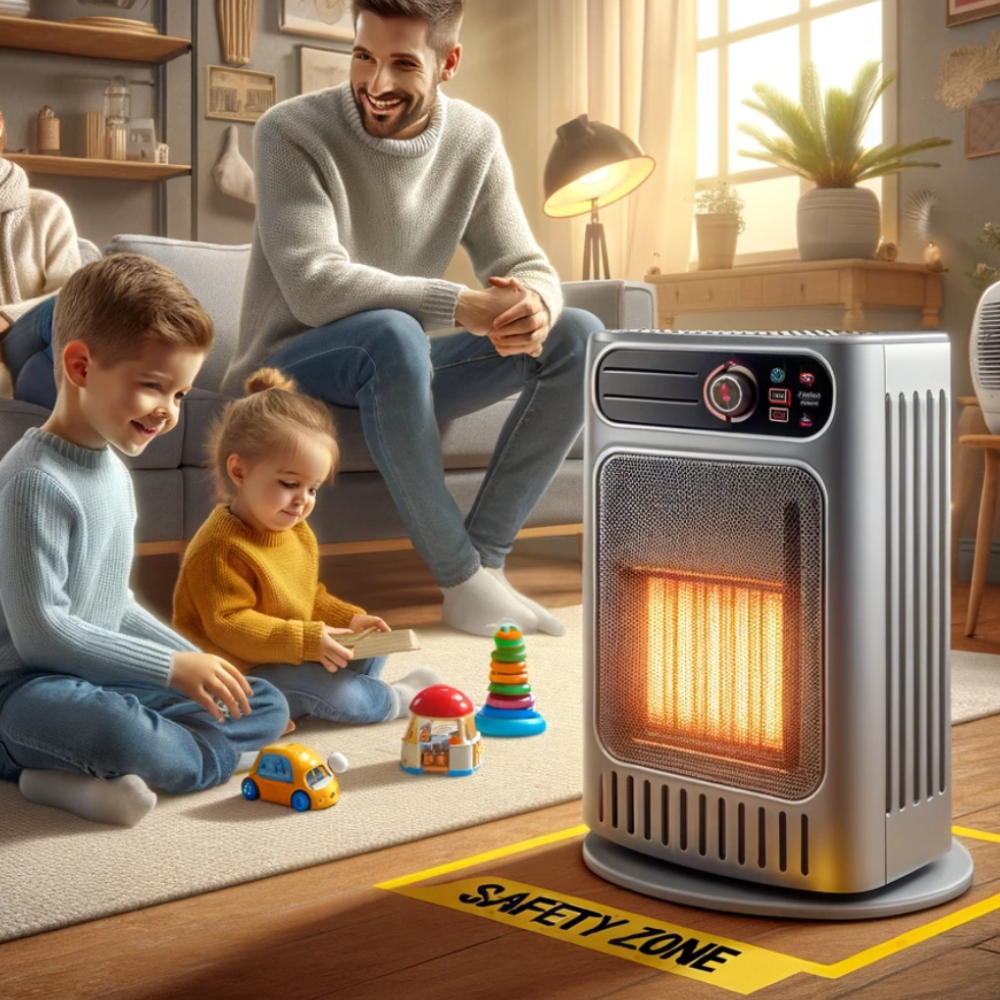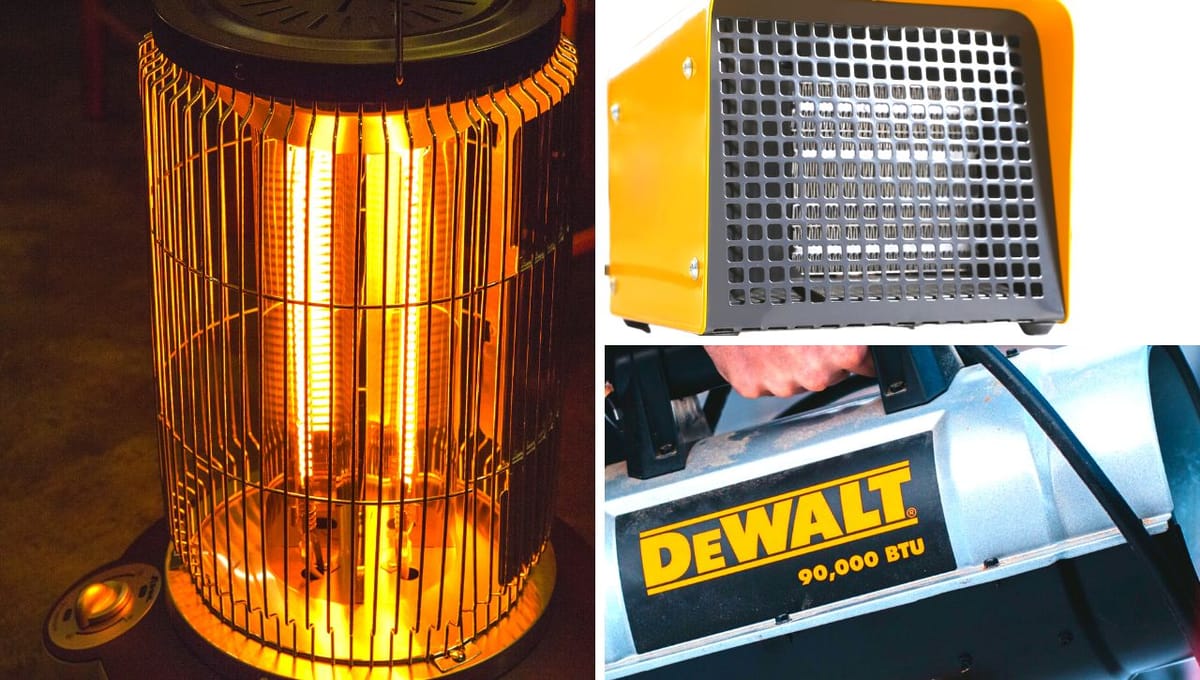Key Takeaways:
- Battery-operated space heaters offer a convenient source of supplemental heat but come with safety considerations.
- Understanding the proper usage and safety features of portable space heaters can mitigate risks.
- Regular maintenance and adherence to the manufacturer's instructions are crucial for safe operation.
Space heaters have become a staple in many homes, especially during the colder months when the chill seeps in and the central heating system might not be enough. Among the various types of space heaters, battery-operated models have gained popularity due to their portability and convenience. However, the question remains: are battery-operated space heaters safe? This article will delve into the safety aspects of these devices, providing you with the information you need to use them responsibly.

The Basics of Battery-Operated Space Heaters
Battery-operated space heaters are designed to provide supplemental heat in areas where traditional heating may not reach or to save energy by heating only a specific space instead of the entire home. Unlike electric heaters that plug into a wall outlet, these portable heaters use batteries as their power source, making them highly convenient for use in different locations.
Safety Features to Look For
When shopping for the safest space heaters, it's essential to look for models with built-in safety features. These can include a tip-over switch, which automatically turns the heater off if it falls over, overheat protection to prevent the heating element from reaching dangerous temperatures, and a sturdy, flat surface to reduce the risk of tipping. Additionally, some modern space heaters come with timers and programmable thermostats for better control over heating and energy use.

Understanding the Risks
While battery-operated space heaters are generally safe when used correctly, they are not without risks. The National Fire Protection Association reports that heating equipment is a leading cause of home heating fires. Space heaters need to be used with caution, as they can pose a fire hazard if placed near flammable materials or left unattended.
Proper Placement and Usage
To ensure space heater safety, it's crucial to place the heater on a flat, stable surface away from foot traffic, pets, and children. Keep the heater at least three feet away from flammable objects such as curtains, bedding, and furniture. Never use a space heater to cook food, dry clothing, or as a tabletop unless it's designed for that purpose.
The Importance of Regular Maintenance
Maintaining your space heater is vital for safe operation. Regularly check for cracked or broken plugs, and loose connections, and ensure the battery is in good condition. Clean the heater as per the manufacturer's instructions to prevent dust buildup, which can be a fire risk. Replace the heater if it shows signs of wear or damage.
Combustion Space Heaters vs. Electric Models
While this article focuses on battery-operated space heaters, it's worth noting the differences between them and fuel-burning space heaters. Combustion space heaters, such as those powered by propane or natural gas, carry additional risks, including carbon monoxide poisoning. Always use a carbon monoxide detector when operating these types of heaters and ensure proper ventilation.

The Advantages of Infrared Space Heaters
Infrared space heaters are a modern marvel in the realm of home heating. Unlike traditional heating equipment that warms the air, these devices emit infrared radiation that directly heats objects and people in their path.
This method of heat transfer is highly efficient, as it minimizes the loss of heat to the surrounding air and instead concentrates warmth exactly where it's needed. Homeowners appreciate the immediate comfort without the wait associated with central heating systems. Moreover, infrared heaters can save energy and reduce costs, as they provide supplemental heat only in the areas being used.
The safety of infrared heaters is often highlighted, especially when compared to combustion space heaters that rely on natural gas or propane. Since infrared heaters do not burn fuel to create heat, there's no risk of carbon monoxide poisoning, making them one of the safest space heaters available.
Additionally, many models come with built-in safety features such as overheat protection and a tip-over switch, which automatically shuts the heater off if it's knocked over. This focus on safety, combined with their efficiency, makes infrared heaters a compelling choice for cautious consumers.

The Significance of Overheat Protection in Space Heaters
Overheat protection is a critical safety feature in modern space heaters, designed to prevent potential fire hazards. When a space heater's internal components reach an unsafe temperature, this mechanism automatically shuts off the power to avoid overheating.
This is particularly important in portable electric space heaters, which may be left running for extended periods. By incorporating overheating protection, manufacturers aim to reduce the risk of home heating fires, ensuring that electric heaters can provide supplemental heat without compromising safety.
Moreover, the presence of overheating protection offers peace of mind to users. It allows for safer operation, especially in scenarios where close supervision isn't possible, such as during the night or when the room is unoccupied. Consumers should always check for this feature when choosing the safest space heaters.
It's a simple yet effective way to safeguard against the dangers associated with heating elements reaching excessive temperatures, which can ignite flammable materials nearby.
The Integration of Smart Technology in Space Heaters
As we delve into the realm of modern space heaters, the integration of smart technology is a game-changer. Imagine controlling your portable electric space heater from the comfort of your smartphone.
These advanced heaters can be programmed to turn on at specific times, adjust heat settings, and even shut off when the desired temperature is reached. This not only ensures that your living space is always at a comfortable temperature but also helps save energy by preventing unnecessary heating.
Moreover, smart space heaters often come with built-in safety features such as tip-over switches and overheat protection, which are essential for maintaining a safe environment. Some models can even alert you if they've been left on for an extended period or if there's a sudden temperature drop in the room.
By incorporating these intelligent functions, electric heaters are becoming safer and more user-friendly, providing peace of mind to those concerned about the risks associated with heating equipment.

The Significance of Proper Ventilation with Space Heaters
When discussing whether battery-operated space heaters are safe, it's crucial to consider the role of ventilation. Proper ventilation is essential, especially for fuel-burning space heaters that emit exhaust, which can include harmful gases like carbon monoxide.
A well-ventilated area ensures that any potentially dangerous fumes are quickly dispersed, reducing the risk of inhalation and promoting a healthier environment. Even electric heaters can benefit from ventilation, as it help to distribute heat more evenly and prevents the buildup of dry, stale air.
In addition to health benefits, ventilation can also enhance the efficiency of space heaters. By allowing air to circulate, portable heaters can distribute warmth more effectively throughout the room.
This means that the heater doesn't have to work as hard to maintain a comfortable temperature, which can save energy and reduce wear on the heating element. Always ensure that the room has an adequate supply of fresh air when using any type of space heater, and follow the manufacturer's instructions for proper usage and ventilation.

The Importance of Child and Pet Safety Around Space Heaters
When considering the safety of portable space heaters, it's important to address the concerns of households with children and pets. Kids and animals are naturally curious and may not understand the dangers associated with space heaters.
To ensure that space heaters are safe in homes with little ones or furry friends, look for models with a tip-over switch, which automatically turns the heater off if it gets knocked over. Additionally, keeping heaters out of reach or in a designated pet-free zone can prevent accidental burns or fires.
Moreover, educating children about the dangers of space heaters and establishing strict rules about not touching or playing near them is vital. For added safety, choose space heaters with cool-to-touch exteriors and avoid placing them near flammable materials like curtains or bedding.
By taking these precautions and always supervising the use of space heaters around children and pets, you can provide supplemental heat without compromising the safety of your loved ones.

The Impact of Space Heaters on Indoor Air Quality
When discussing the safety of space heaters, it's crucial to consider their impact on indoor air quality. Electric space heaters, particularly those without fans, operate by directly heating objects and surfaces in a room through infrared radiation.
This method of heating does not compromise the air quality since there is no combustion involved, making them a preferable option for those with respiratory issues or allergies.
Conversely, fuel-burning space heaters, such as those powered by propane or natural gas, can emit harmful byproducts like carbon monoxide if not properly ventilated. It's imperative to have a functioning carbon monoxide detector in any space where combustion space heaters are used.
Additionally, these heaters must be kept away from flammable materials and operated according to the manufacturer's instructions to minimize the risk of home fires and ensure they provide supplemental heat safely.

The Role of Carbon Monoxide Detectors with Fuel-Burning Space Heaters
While electric space heaters are a popular choice for many, some households opt for combustion space heaters that run on fuels like propane or natural gas. These heaters can be efficient in providing heat, but they come with the added risk of carbon monoxide (CO) production.
A carbon monoxide detector is an essential safety device that should be installed in any home using fuel-burning space heaters. It alerts residents to the presence of CO, which is a colorless, odorless, and potentially lethal gas.
The National Fire Protection Association strongly recommends the use of carbon monoxide detectors as part of a comprehensive safety strategy for homes with combustion heaters. Regular maintenance, including checking for cracked or broken plugs and ensuring proper ventilation, is also crucial to prevent CO buildup.
By combining CO detectors with careful adherence to the manufacturer's instructions and safety tips, users can enjoy the warmth of their propane heaters or natural gas heaters while minimizing the risk of carbon monoxide poisoning.

Space Heater Innovations and Technology
The landscape of portable electric space heaters is constantly evolving, with manufacturers introducing new technologies to enhance safety and performance. One of the latest innovations is the integration of smart sensors that detect the presence of flammable materials nearby.
These sensors can automatically adjust the heat settings or shut down the heater to prevent overheating and potential fires. This advancement is a significant step forward in space heater safety, offering peace of mind to users who might otherwise be concerned about the risks associated with heating elements and flammable objects.
Another technological leap is the development of space heaters with Wi-Fi capabilities, allowing users to control their portable heaters via a smartphone app. This feature not only adds convenience but also enhances safety by enabling remote monitoring and control.
Users can ensure their space heater is turned off when not needed, or adjust temperature settings without having to physically interact with the device. This reduces the chances of leaving a heater unattended or allowing it to run unnecessarily, which can be a fire hazard.
As these innovations become more widespread, the reputation of space heaters as a safe and smart home heating option continues to improve.

Electric Heaters and Electrical Safety
Electric space heaters, though not the focus of this article, should also be used with caution. Plug space heaters directly into a wall outlet rather than an extension cord or power strip to avoid overloading the circuit. Check the heater's plug and cord for any signs of damage before each use.
The Role of Safety Certifications
When purchasing a portable space heater, look for certifications from recognized safety organizations such as the Consumer Product Safety Commission (CPSC) or Underwriters Laboratories (UL). These certifications indicate that the heater has been tested for safety and meets specific standards.
Space Heater Safety Tips
To maximize safety, follow these space heater safety tips:
- Read and adhere to the manufacturer's instructions before using the heater.
- Keep the heater in a pet-free zone to prevent accidents.
- Never leave the heater unattended or fall asleep with it running.
- Use the heater for its intended purpose only and avoid using it in damp areas unless it's rated for such use.
Energy Efficiency and Cost-Effectiveness
Battery-operated space heaters can be energy-efficient and cost-effective when used as a supplemental heat source. By heating only the room you're in, you can lower the thermostat for your central heating system, which can help save on energy bills. However, remember that batteries need to be recharged or replaced, which can add to the overall cost and environmental impact.

The Evolution of Space Heaters
Modern space heaters have come a long way in terms of safety and efficiency. Features like ceramic heating elements, infrared radiation, and convection technology have improved the way these devices create heat and retain it, making them safer and more effective at warming a space.
Choosing the Right Heater for Your Needs
When selecting a portable space heater, consider the size of the space you need to heat, the type of heat you prefer (radiant or convection), and the safety features that are important to you. Ceramic heaters, for example, are often considered among the safest space heaters due to their ability to regulate temperature and reduce the risk of burns.
Summary
Battery-operated space heaters can be a safe and convenient way to provide supplemental heat when used responsibly. By understanding the risks, choosing models with robust safety features, and adhering to proper usage guidelines, you can enjoy the warmth of a space heater without compromising safety. Regular maintenance and attention to the manufacturer's instructions are key to ensuring the longevity and safe operation of your portable heater.
FAQ Section
Q: Can battery-operated space heaters cause carbon monoxide poisoning? A: Battery-operated space heaters that do not burn fuel do not produce carbon monoxide. However, it's always a good practice to have a carbon monoxide detector in your home, especially if you use any combustion heating equipment.
Q: How long can I safely run a battery-operated space heater? A: The duration you can run a battery-operated space heater depends on the heater's design and the capacity of the batteries. Always follow the manufacturer's instructions and built-in timer settings to prevent overheating and conserve battery life.
Q: Are there any special considerations for storing battery-operated space heaters when not in use? A: When storing your battery-operated space heater, remove the batteries to prevent corrosion, clean the heater thoroughly, and store it in a dry, cool place. Check the manufacturer's instructions for specific storage guidelines to maintain the heater's safety and functionality.
Thank you for reading this article, and stay safe!
Your Friend,
Karie

Battery operated heater







